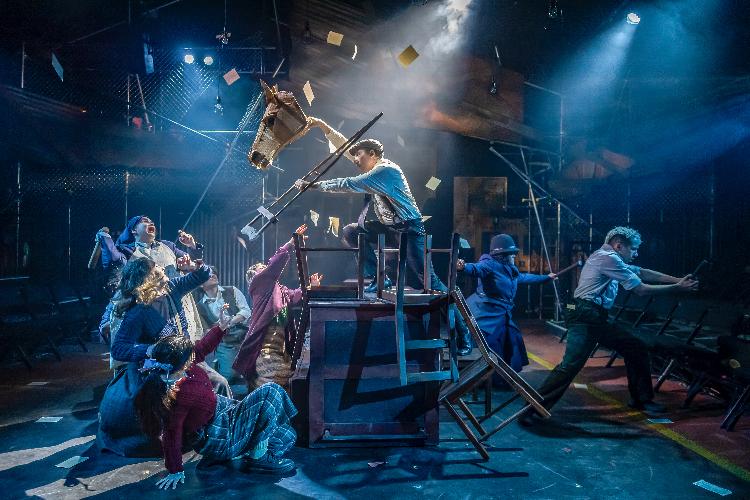Cable Street is a new musical, written by composer/lyricist Tim Gilvin, and playwright Alex Kanefsky, making its debut at Southwark Playhouse this month. The show is a reimagining of The Battle of Cable Street, where people of the East End took to the streets to protest and fight against Oswald Mosley's British Union of Fascists, known as Blackshirts.
Taking place in ‘The Large' at Southwark Playhouse would be a challenge for an ensemble-heavy production such as this with its intimate space, but Yoav Segal's set design opens up the space extremely well, introducing a multi-level performance space, and home the band without taking away from the industrial style of the set. The show only feels a little too big for its space during moments of full-cast choreography.
The musical takes place in both 1936, and the present day, and shifting between the two is supported by its blend in music. The show's musical numbers are a mixture of various genres but is heavily influenced by modern-day music. There are some beautiful songs in the show, such as ‘Stranger / Sister' performed by the incredible Jade Johnson, where she sings about how standing up with others who believe in fighting for what is right can make a stranger become a sister. Unfortunately, powerful and emotive moments like this are slightly overshadowed by a mismatch of the decision to introduce ‘modern' styles of music such as rap and trap. Although usually a perfect art form to express political standpoints, the choice of beats and synth used on the rap sections, which is only a style used by one character, is a simplistic and stereotypical representation of the genre. Although the performer hits every word with clarity and perfect timing, the clichéd music backing the words takes away from the important message the character is trying to convey.
However, this should not allow the huge successes of this show to be overglanced. Danny Colligan, playing the part of Ron Williams – a young boy who has moved down South to find work and becomes influenced by the Blackshirts who promise to help him find it, provides the audience with flawless vocals, and an emotive portrayal of his character throughout the performance. We are also introduced to the beautiful tone of Sha Dessi, leading the barricade with her power and fiery performance.
In certain moments, the fusion of modern genres proves effective within the piece, such as during the number ‘Sunrise' in the second act, celebrating the retreat of the Blackshirts. Here, a subtle incorporation of contemporary styles in the music perfectly complements the storyline, hinting at the shift back to the present day. However, as soon as the rap sections are introduced again, we are reminded that the chosen musical style of the production is somewhat discordant.
Cable Street is running at Southwark Playhouse Borough until the 16th of March.
Review: Anna Hulm Photo: Janel Hobson

